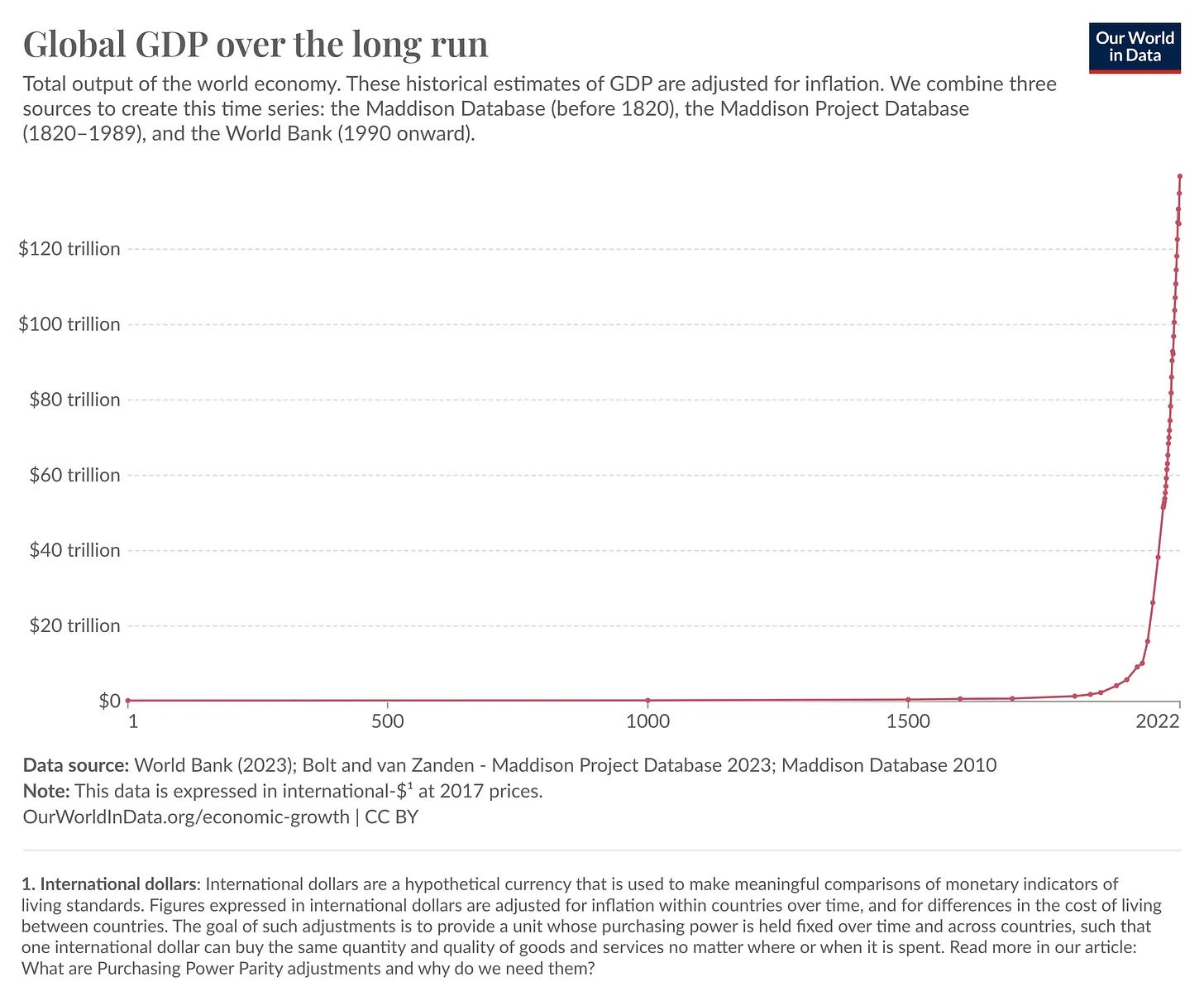Dude! Where's My Job
Introduction
Throughout history, technology has repeatedly reshaped how we live, work, and what we produce. Despite recurring fears of job losses, employment continually evolves to meet the changing world demands. As we enter a new era dominated by artificial intelligence and automation, a key question is: How will our jobs evolve, and is this time different? In this blog post, we will explore how jobs have changed over time and examine how AI might shape the future of work.
Historical POV
For most of human history, the world's economy grew very slowly. However, starting around 200 years ago, it began to explode upwards at an incredible rate, reaching levels today that would have been unimaginable to our ancestors.
To keep up with this explosion of growth, employment has evolved drastically. Key changes were:
Agriculture: 60% of employment in 1850 —> less than ~3% of jobs today
Manufacturing: Peaked at 26% in 1960 —> below 10% due to automation and globalization.
Services, healthcare, and technology sectors: Dramatic growth
These shifts demonstrate society's remarkable adaptability. As education and technology improve and new industries arise, we've consistently found ways to redirect our workforce, driving economic growth and enhancing living standards.
The Evolution of Work: From Deskilling to Non-Skilling
Given this historical trend of adaptability, one might assume it will continue. However, Stanford Professor Erik Brynjolfsson argues that this time is different, with more jobs potentially lost than created. He provides a framework for three waves of technological change in the workplace, helping us understand where we've been and where we're headed.
Wave 1: Deskilling
In this wave, complex skilled jobs were simplified by technology.
Example: Shoemaking
Before: Craftsmen spent years mastering a wide range of skills
After: Assembly line workers could learn to operate machines quickly
Results:
Lower labour costs and more affordable products
But also, lower-paying jobs replaced higher-paying ones
Wave 2: Upskilling
This wave introduced new technologies that required more advanced skills.
Example: Accounting
Before: Manual bookkeeping
After: Accountants used Excel, drastically increasing productivity
Results:
Fewer, but higher-paying jobs
Workers needed to learn new technological skills
Wave 3: Non-Skilling
In this emerging wave, AI and robotics may eliminate the need for human workers in some roles entirely.
Example: Transportation
Current: Human drivers operate vehicles
Future: Driverless vehicles could replace human drivers completely
Potential impacts:
AI might perform tasks better than humans in many areas
Cost savings and improved performance for businesses
But also, potential large-scale job displacement
The Future of Work: Navigating between Wave 2 and 3
As we transition from Wave 2 (Upskilling) to Wave 3 (Non-Skilling), how do we ensure we don’t automate ourselves out of work? James Dale Davidson and Lord William Rees-Mogg, authors of "The Sovereign Individual," offer an insightful perspective:
"In the information age, a job will be a task to do, not a position you have."
This quote summarizes the expected shift in what work means for us in the future: a move from fixed positions to task-based work. In this new world, individuals will navigate between projects and roles based on their skills and market demands, rather than holding a permanent position with one employer. We're already seeing this play out in the growing gig economy.
Building on this concept, Thomas Friedman identifies three crucial areas where AI will support the shift towards task-based work:
Intelligent Assistance: AI-powered learning platforms to help us acquire new skills rapidly
Intelligence Assistants: AI tools to amplify our abilities, enabling us to work smarter and more efficiently
Intelligent Algorithms: AI systems matching people with opportunities, facilitating smooth transitions between tasks and projects
Navigating the Future
As the job market changes, our success will depend on working with AI, not against it. AI won't just replace jobs; it'll change how we work. Think of AI as a powerful tool that can make us better at what we do. This new way of working might be different, but it could also be more exciting and rewarding.
To thrive in this AI-driven future, consider adopting the following strategies:
Embrace lifelong learning & stay adaptable
Develop skills that complement AI (i.e. creativity, emotional intelligence, and complex problem-solving)
Stay informed about technology (i.e keep reading this blog)
Conclusion
The future of work may seem scary, but it's full of opportunities for those ready to embrace change. Every major revolution has brought not only challenges but unprecedented opportunities.
The future of work is not a fixed destination but an evolving journey. By understanding the historical context of job transformation, recognizing the waves of change, and preparing ourselves with the right skills and mindset, we can ensure we are not replaced. Instead, we can continue the past 200-year trend of economic growth and enhanced living standards.
"It is not the strongest of the species that survives, nor the most intelligent that survives. It is the one that is most adaptable to change."
- Attributed to Charles Darwin




